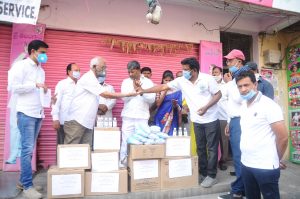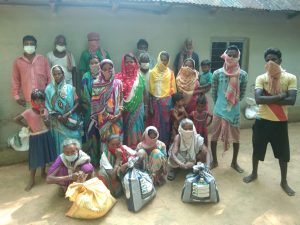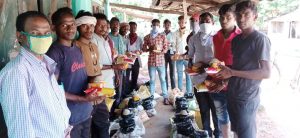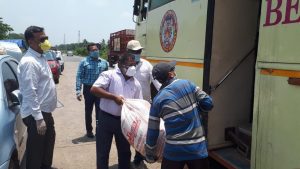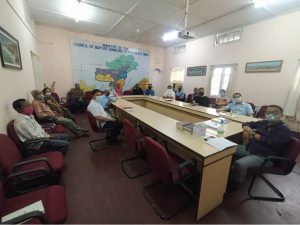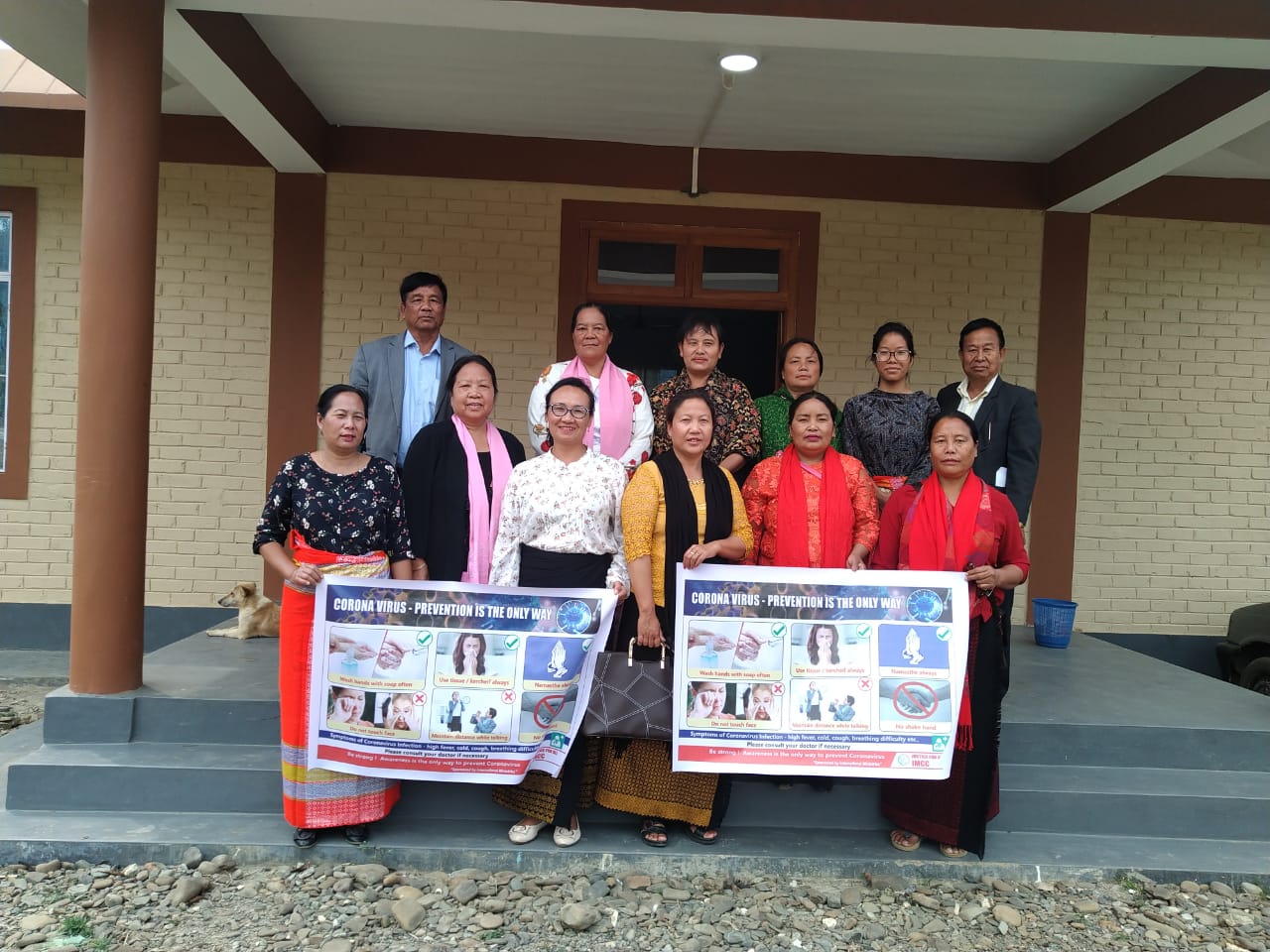
Baptists providing spiritual support and COVID relief in South Asia
Benjamin Chan, Samaresh Nayak, Akheto Sema, Paul Vick
November 16, 2020
International Ministries (IM) and the India Baptist Mission Coordination Committee (IMCC) started the India Coronavirus Crisis WhatsApp Chat Group on March 10 to provide COVID education to churches in South Asia. We then added several more chat groups to share COVID update and provide spiritual support to church leaders via 24 hour prayer rally, virtual joint Baptist worship, and the publication of the India Baptist Herald weekly newsletter. We have also encouraged churches to share local resources to help COVID patients and families who are under financial difficulty. In June, IM began providing food, health kits and financial assistance to churches and Christian organizations from American Baptist One Great Hour of Sharing Fund. Since October, we have been providing more than $30,000 from funds in South Asia to assist 165 pastors in the rural areas, the Council of Baptist Churches in North East India and its member hospitals – yes, we need much more assistance!
Katie and Taku, IM Country Co-Coordinators of South Asia, shared about the difficulty they are facing, “At the onset of the Covid-19 global crisis, the Government of South Asia initiated broad restrictions nationwide in an attempt to curb the spread of the virus. The unanticipated sudden closure of businesses and institutions created chaos for millions of migrant workers who found themselves with no income and for many, homeless. This triggered a mass migration of laborers from urban centers to rural villages resulting in the loss of many lives from the arduous journeys. Initially the lockdown garnered the intended results of prohibiting the spread of the virus but at a great economic cost. The subsequent gradual reduction of restrictions on movement corresponded with increasing cases of Covid-19, extending to every state and union territory in the nation. The month of September witnessed nearly two weeks with over 90,000 daily new cases reported. Presently there is a downward trend in daily new cases to the 60,000’s and the present number of cases nationwide stands at 7,370,468 with 112,161 deaths. Thankfully 6,448,658 patients have recovered bringing the recovery rate to 98.29%. (Figures as of mid-October) Still the situation is precarious as the cases are occurring in rural and less populated areas where treatment options are severely limited. This is a critical month as the beginning of the festival season with major Hindu celebrations approaching. The government is permitting the worship venues and gatherings for worship. It is highly unlikely that social distancing and hygiene protocols will be enforceable. These could become ‘super-spreader’ events resulting in a dramatic rise in cases in the ensuing weeks.” As of November 16, South Asia has a total of 8,868,468 COVID cases, 130,417 deaths (about 2%), and 8,282,065 (about 98%) recovered according to Worldometers (https://www.worldometers.info/coronavirus/country/india/).
Samaresh Nayak, IMCC Executive Director explained that “The Covid-19 panicky began with the declaration of national lockdown beginning from March 25, 2020. The market was closed, business were shutdown, government and private sectors were closed except emergency supplies. The first phase of lockdown was declared for 21 days, which eventually extended until the end of May. Within the first two-week time large number of people started finding difficult to get their daily needs. People on daily wages, people with small business, private sectors, migrant workers, farmers, homeless people in the cities became the quick victims of the lockdown. The migrant workers started moving homeward by walking, cycling or packed in goods transport trucks having the industries closed and without money in their hands. The IMCC mobilized a nationwide prayer network and a weekly newsletter to take the stock of local situation throughout the nation. Often, we heard from the rural churches, that there are scarcities of food due to no income, families who used have 3 to 4 meals a day are trying to manage with one square meal a day. Pastors who depended on the church revenues did not receive their salaries as the churches are closed and people did not have income to pay to the churches. The urban churches opened up their treasuries to provide food packets, groceries, masks, sanitizers to fight hunger and Covid-19. But for how long as the churches are closed and no income for their churches? The IMCC continue to share, inform and encourage the South Asian churches, individuals and the International Ministries to join hands in this time of crisis. A local church or a local association or individuals could not have done everything on their own unless there are united efforts. A joint effort could support the situation and sustain people from hunger, awareness and to be protected.”
Akheto Sema, General Secretary of the Council of Baptist Churches in North East India (CBCNEI) carries a very heavy burden of how to maintain the operation of the Council. He shared that “since the beginning of the COVID-19, this SARS-CoV-2 has claimed over million lives across the world. South Asia is one the worst affected countries in the world. The North East India particularly, Assam, Manipur, Arunachal Pradesh and Nagaland also have been experiencing steady surge of COVID-19 Pandemic. CBCNEI has six hospitals in four states such Jorhat Christian Medical Centre (JCMC), Jorhat, Satribari Christian Hospital Guwahati both in Assam, Tura Christian Hospital and Babupara Christian Hospital in Meghalaya, one each Nagaland and Manipur namely Impur Christian, Hospital and Kangpokpi Christian Hospital respectively. These hospitals are founded by American Baptist missionaries and still have the reputations for dedications and compassionate medical care. During this very challenging time none of our hospital could be closed due to pressing need of care services of patients other than COVID-19. The burden of caring stranded general patients came to all the hospitals.
“The respective state government also ordered hospitals to undertake diagnosis and treatment of COVID-19 patients. For example JCMC has been asked to undertake diagnosis and treatment both, So JCMC has installed Tru-Nat diagnostic equipment cost of Rs. 10 lakhs (about US$14,300) and other accessories and also earmarked 10 bedded wards for COVID patients. Similarly Satribari Christian Hospital was ordered by Government to undertake diagnosis of COVID but due to paucity of fund, hospital could not procure Tru-Nat Machine and finally opted for collaboration with Apollo Hospital Guwahati and open Laboratory has been established where sample collection and transportation is done. Also ten bedded COVID war has been earmarked.
“Similarly Tura Christian Hospital is asked by government for sample collection and referral services. Kangpokpi Christian Hospital and Babupara also have doing similar way. Since the resources of the hospitals are limited, the hospital still needs to cope up the pressing needs of the monitor, ventilators and PPE to keep the hospital minimum preparedness as COVID-19 is far from over.”
Paul Vick, IM Treasurer, who has an active involvement in India mission, shared his reflection, “In the early 1860’s American Baptist missionary Lyman Jewett sent out an appeal for funds needed to buy land in Ongole, India for the purpose of purchasing land to establish a mission compound (he had already committed to the purchase but had no funds). A friend in the US had just received an unexpected inheritance and was in prayer as to its use. That inheritance was sent to Lyman Jewett securing the land. Soon thereafter, a church was constructed. By the end of the century, The Jewett Memorial Church had become purportedly the largest Baptist church in the world serving more than 20,000 Telugu people.
“One hundred years later, another American Baptist missionary, the Reverend Doctor Fredrick Downs, then serving at the Eastern Theological College (ETC) in Jorhat, Assam (he later served with the Bangalore people in southern India), sent out an appeal for funds to construct needed buildings supporting its growing mission of training pastors. In response to that appeal, my home church Immanuel Baptist raised $30,000 which, when added to contributions from many others, enabled ETC to renovate and expand its facilities. Today, ETC is one of the preeminent seminaries in South Asia providing trained pastoral leadership serving in many capacities throughout South Asia.
“Fifty years later, South Asia has been desecrated by the COVID-19 virus. Particularly hard hit have been the immigrants who have sought shelter within South Asia. There simply are not enough supplies or other resources to respond to life threatening situations confronting so many. Through the faithful stewarding of resources provided by the American Baptist family over the past 175 years, we have been able to provide some assistance but the need is so much greater. We have seen in the past that when pleas for funds have gone out, gifts made by our American Baptist family have been blest and multiplied. Our prayer is that hearts will be opened and that resources with which we have been blessed can be shared with those who suffer from this pandemic bringing healing, comfort and hope.”
* Click to give to COVID-relief: https://internationalministries.org/covid-19-response-for-global-relief/
* Click to give to World Mission Offering: https://internationalministries.org/world-mission-offering/
